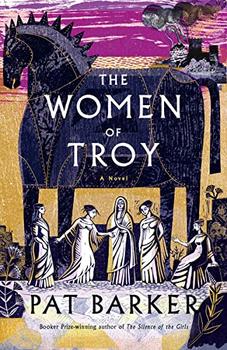Summary | Excerpt | Reading Guide | Reviews | Beyond the Book | Readalikes | Genres & Themes | Author Bio

1
Inside the horse's gut: heat, darkness, sweat, fear. They're crammed in, packed as tight as olives in a jar. He hates this contact with other bodies. Always has. Even clean, sweet-smelling human flesh makes him want to puke—and these men stink. It might be better if they kept still, but they don't. Each man shifts from side to side, trying to ease his shoulders into a little more space, all intertwined and wriggling like worms in a horse's shite.
Redworm.
The word sends him spiralling down; down, down, into the past, all the way back to his grandfather's house. As a boy—which is what some seem to think he still is—he used to go down to the stables every morning, running along the path between the tall hedges, breath curdling the air, every bare twig glinting in the reddish light. Turning the bend, he would see poor old Rufus standing by the gate of the first paddock—leaning on it, more like. He'd learnt to ride on Rufus; nearly everybody did, because Rufus was a quite exceptionally steady horse. The joke was, if you started to fall off, he'd stretch out a hoof and shove you back on. All his memories of learning to ride were happy, so he gave Rufus a good scratch, all the places he couldn't reach himself, then breathed into his nostrils, their breaths mingling to produce a snuffly, warm sound. The sound of safety.
God, he'd loved that horse—more than his mother, more even than his nurse, who, anyway, had been taken away from him as soon as he was seven. Rufus. Even the name had formed a bond: Rufus; Pyrrhus. Both names mean "red"—and there they were, the two of them, spectacularly red-haired, though admittedly in Rufus's case the colour was more chestnut than auburn. When he was a young horse, his coat used to gleam like the first conkers in autumn, but of course he was older now. And ill. As long ago as last winter, a groom had said, "He's looking a bit ribby." And every month since then, he'd lost weight; pelvic bones jutting out, sharp points to his shoulders—he was starting to look skeletal. Not even the lush grass of summer had put fat on his bones. One day, seeing a groom shovelling up a pile of loose droppings, Pyrrhus had asked, "Why's it like that?"
"Redworm," the man said. "Poor old sod's riddled with 'em."
Redworm.
And that one word delivers him back to hell.
——————
At first, they're allowed rush lamps, though with the stern warning that these would have to be extinguished the minute the horse began to move. Frail, flickering lights, but yet without them the pelt of darkness and fear would have suffocated him. Oh, yes, fear. He'd deny it if he could, but it's here, unmistakably, in the dryness of his mouth and the loosening of his bowels. He tries to pray, but no god hears, and so he shuts his eyes and thinks: Father. The word feels awkward, like a new sword before your fingers grow accustomed to the hilt. Had he ever seen his father? If he had, he'd have been a baby at the time, too young to remember the most important meeting of his life. He tries Achilles instead—and it's actually easier, more comfortable, to use the name that any man in the army can.
He gazes along the row of men opposite, seeing each face lit from below, tiny flames dancing in their eyes. These men fought beside his father. There's Odysseus: dark, lean, ferret-like, the architect of this whole enterprise. He designed the horse, supervised its construction, captured and tortured a Trojan prince to get details of the city's defences—and finally concocted the story that's supposed to get them through the gates. If this fails, every leading fighter in the Greek army will die in a single night. How do you carry a responsibility like that? And yet Odysseus doesn't seem at all concerned. Without meaning to, Pyrrhus catches his eye and Odysseus smiles. Oh, yes, he smiles, he seems friendly, but what's he really thinking? Is he wishing Achilles were here, instead of that useless little runt, his son? Well, if he is, he's right, Achilles should be here. He wouldn't have been afraid.
Excerpted from The Women of Troy by Pat Barker. Copyright © 2021 by Pat Barker. Excerpted by permission of Doubleday. All rights reserved. No part of this excerpt may be reproduced or reprinted without permission in writing from the publisher.
Your guide toexceptional books
BookBrowse seeks out and recommends the best in contemporary fiction and nonfiction—books that not only engage and entertain but also deepen our understanding of ourselves and the world around us.